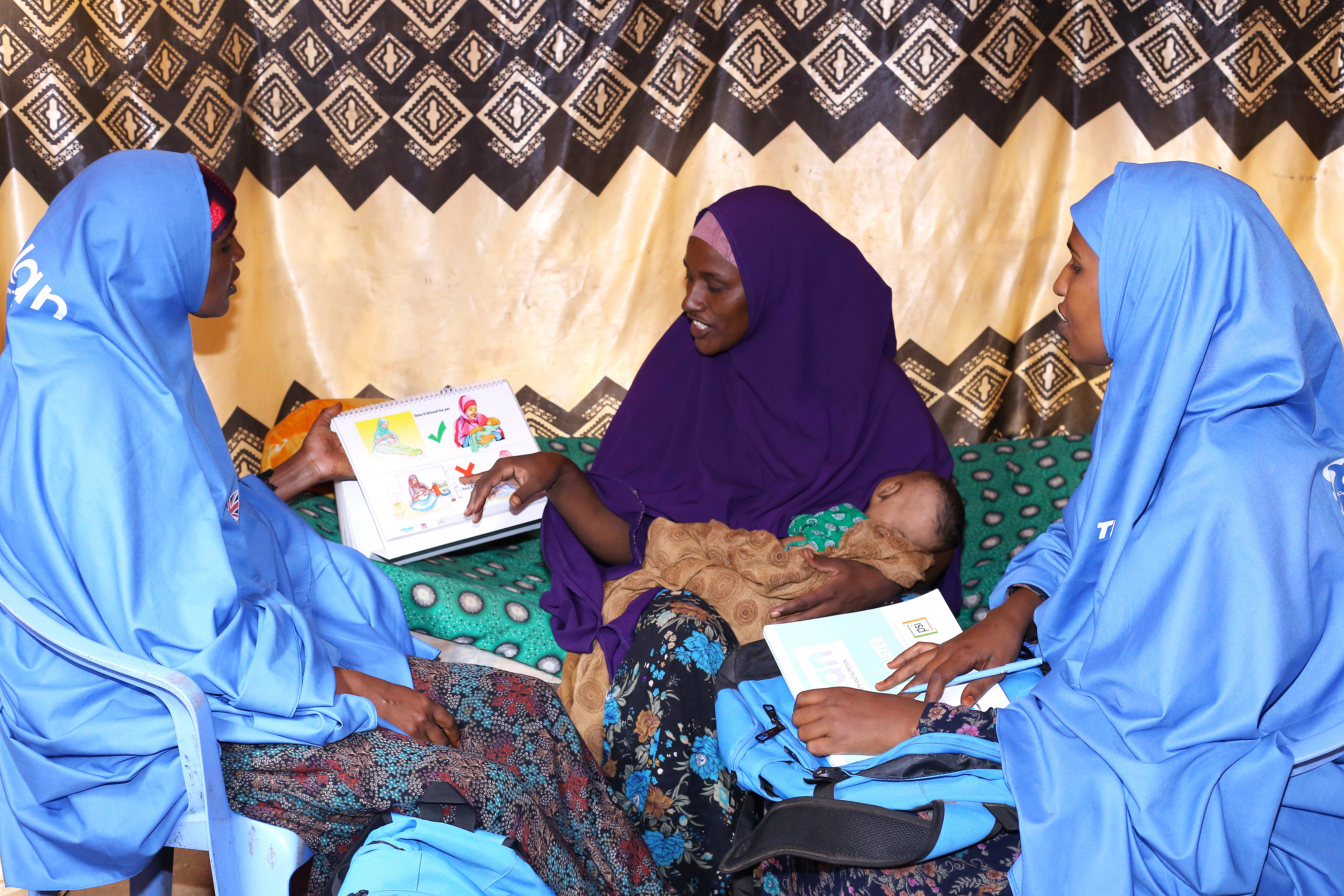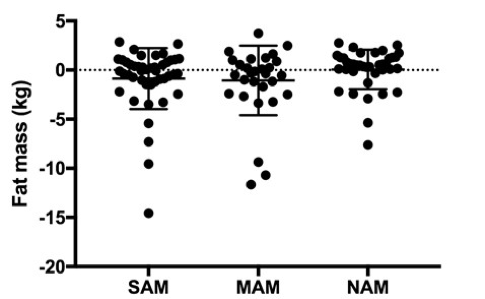Barriers to exclusive breastfeeding among children in Gedo region, Somalia
By Rowena Ndakwe and Dr Abdi Tari
Rowena Ndakwe is the current MEAL Coordinator for Trócaire Somalia, with over five years’ experience in monitoring, evaluation, research and accountability and a core focus on food security; nutrition; health, water, sanitation and hygiene (WASH); and education. Rowena has a strong academic background in applied human nutrition.
Dr Abdi Tari is the current Head of Programmes for Trócaire Somalia, with over 15 years’ experience in implementation and quality assurance of humanitarian programmes in the Horn of Africa, with a strong academic and professional background in health systems strengthening and service delivery. He has technical expertise in WASH, education and food security.
The authors would like to acknowledge Rankstat Africa Consulting firm for working in collaboration with Trócaire in carrying out the research.
Location: Somalia
What we know: Good infant and young child feeding knowledge does not necessarily ensure improved practice.
What this article adds: A knowledge, attitudes and practices (KAP) survey on infant and young child feeding (IYCF) was carried out by Trócaire in three districts of Gedo region, Somalia in 2016 and repeated in 2018 (sample size 685 households with children between 0 and 23.9 months of age) to inform a programme intervention. The baseline survey demonstrated high knowledge on IYCF among caregivers, but low scores in key IYCF practices and very low exclusive breastfeeding rates (14%). The mid-term survey demonstrated increased levels of all breastfeeding indicators compared to baseline; however, although doubled, exclusive breastfeeding rates remained low (34.8%). Focus group discussions revealed barriers to practice included perceived and possibly actual inadequate milk supply; influence of elderly community members; competing activities for mothers (household chores and casual labour); and cultural beliefs. There is a need to identify, sensitise and involve additional community gatekeepers and influential individuals in the delivery of IYCF services to provide additional support to women to improve rates of exclusive breastfeeding.
Introduction
Trócaire Somalia is implementing a health and nutrition programme in three districts of Gedo region in Somalia (Luuq, Dollow and Bulla Hawa). The programme has been running since 2013 and, based on an initial needs assessment, is built on four pillars: (1) management of severe acute malnutrition (SAM) and moderate acute malnutrition (MAM) cases; (2) health and nutrition prevention and promotion through an infant and young child feeding (IYCF) programme; (3) monitoring and surveillance; and (4) capacity-building for health workers. The second pillar on IYCF was incorporated at the onset of the programme as a prevention pillar to promote good nutrition and infant and young child development, without which susceptibility to disease and undernutrition grows. As the programme developed, it became clear that IYCF required more understanding to enhance the intervention. Therefore, in April 2016, Trócaire commissioned a knowledge, attitude and practices (KAP) survey to analyse factors influencing IYCF behaviours and to establish a baseline against which progress of the IYCF intervention could be measured. In November 2018, Trócaire conducted a mid-term KAP survey to monitor progress against IYCF indicators and determine any emerging barriers that hinder optimal IYCF practices in the area.
Methodology
The mid-term survey adopted a two-stage cluster-sampling approach. Clusters were selected using probability proportional to population (PPS) size method and households were selected using simple random sampling. The overall sample size for this survey was 685 households with children between 0 to 23.9 months of age, with their primary caregivers being the respondents. The sample size was distributed among the districts through PPS; thus the results are representative at district level. A total of 49 clusters were sampled for this survey, with a response rate of 88.2%, which is considered satisfactory. Data collection was carried out by two teams independently, with one team collecting the quantitative data and the second team collecting the qualitative data.

Results
The baseline survey observed that knowledge on IYCF among caregivers was high, although there was poor and low practice of some recommended IYCF practices. The practice of timely initiation of breastfeeding was relatively high (69.1% compared to the 70% global target), along with continued breastfeeding at one year (88% compared to the 80% global target). However, the exclusive breastfeeding rate was worryingly low (14.% compared to the global target of 70%) and continued breastfeeding at two years was also low (30.7% compared to the 60% global target).1 The mid-term survey noted increased levels of all the breastfeeding indicators when compared with the baseline survey results (Figure 1); however, exclusive breastfeeding rates still remained low at 34.8% (more than double the baseline rate but lower, for example, than the 2018 average global exclusive breastfeeding rate of 41%).2/p>
Figure 1: Breastfeeding practices in Gedo region, Somalia in 2016 and 2018

Key: BF = breastfeeding
By district, Luuq recorded the highest exclusive breastfeeding rate at 42.2%, followed by Bullahawa at 30.6%. Dollow recorded the lowest rate at 26.3%. Specific liquids given to infants less than six months old besides breastmilk included plain water (35.5%), milk (19.6%) and glucose/sugar water (16.7%). Other drinks given to infants in this age group included water with honey (11.6%), fruit juice (6.5%), and tea and porridge (4.3%). This is in spite of high levels of knowledge and positive attitudes concerning exclusive breastfeeding. A total of 80.0% of the surveyed primary caregivers were aware that children aged less than six months should be fed with breastmilk only. A higher proportion of primary caregivers were aware of the need to exclusively breastfeed in Dollow (89.1%) compared to those in Luuq (74.4%). In terms of attitudes to exclusive breastfeeding, 82.1% of primary caregivers had a positive attitude, with Bullahawa recording the highest level at 86.6%, followed by Luuq at 85.4% and Dollow at 69.3%. Exclusive breastfeeding knowledge, attitudes and practices are summarised by district in Figure 2.
Figure 2: Knowledge, attitudes and practices of exclusive breastfeeding in Gedo region, Somalia

Discussion
From the findings, it is clear that the knowledge and positive attitude towards exclusive breastfeeding (both showing high scores) were not translating into practice in Gedo region in many cases. Exclusive breastfeeding rates were still well below recommended rates, in spite of the increase in the practice from baseline. The rise in rates could be attributed to the introduction of the IYCF approach by Trócaire, which included robust community participation to improve KAP of primary caregivers of infants and young children in the area. Since the baseline survey, Trócaire has rolled out a number of activities in the field aimed at improving IYCF practices. It has trained and mentored 30 community nutrition workers (CNWs), who have been charged with responsibility for community education (especially targeting practices) on infant and young children feeding practices. The CNWs provide IYCF education to mothers of children under two years of age, focusing on both breastfeeding and complementary feeding sessions. The trained mothers are thereafter expected to share the knowledge with other mothers in the community. In addition, over 400 men have been targeted for IYCF education over the last two years. Trócaire has also held sensitisation meetings with other key influencers as identified during the baseline survey, including community gatekeepers and traditional birth attendants, among others.
Despite these efforts, while the exclusive breastfeeding rate has risen, it remains low. Focus group discussions (FGDs) with caregivers revealed a number of barriers to exclusive breastfeeding among caregivers in the district that helps to explain this finding. These include:
Breastmilk insufficiency: While a high proportion of mothers reported knowing that infants should be exclusively breastfed, caregivers who participated in FGDs largely expressed the belief that breastmilk alone is not sufficient for the growth of the child in the first six months of life. Mothers cited continued crying as an indication that their infants were hungry and hence required other types of foods to complement breastmilk. Some of the potential reasons for breastmilk insufficiency mentioned were poor dietary habits, maternal morbidity and poor health and nutrition. Maternal morbidity was also tied to the belief that not breastfeeding when sick protects the baby and helps the mother recover faster. Key informant interviews also underscored the significance of proper maternal nutrition for breastmilk sufficiency and exclusive breastfeeding. “If the mother is provided with enough food with right nutrients, I believe she can be able to produce enough milk for a child for six months without giving anything else,” Community leader (Dollow).
Elderly mothers’ influence: The influence of older mothers in the community, including grandparents, was also cited as a major reason why exclusive breastfeeding can be difficult for mothers in the community as these women are influential, particularly around childcare, including feeding practices. Older mothers and grandparents appeared to have a different level of knowledge and attitude towards breastfeeding and child feeding practices compared to younger women, which needs more exploration. Findings suggest the need to involve all caregivers and wider community, in addition to mothers, in IYCF sensitisation sessions and activities.
Competing activities: Mothers were reported to be frequently engaged with other household chores, such as fetching water and firewood, and cooking, which can limit time spent with their infants; hence the early introduction of complementary feeding. A common practice in Gedo is for women to go out to fend for the family, mostly through casual labour, leaving children in the care of older mothers, older siblings and other relatives. This reduced frequency of breastfeeding could be a potential cause of insufficient breastmilk.
Cultural beliefs: The survey noted some cultural beliefs in the community that impede exclusive breastfeeding. For example, complementing breastmilk with animal milk and water is understood by primary caregivers to be important, as breastmilk is regarded as “always insufficient” by itself for babies to survive. According to a 2016 FSNAU study3, pastoralist families in South and Central Somalia believe that water must be given whenever a child cries as, if the child should cry and die, the child will report the mother to God. The majority of women in the riverine4 also believe that a child who is exclusively breastfed becomes ‘dhagol’ (deaf) and therefore water and other forms of milk must be given alongside. FGDs also revealed a belief in the community that breastmilk contains human blood (whitened blood) which burns the digestive system of the child, and thus water must be given first to dilute it. There is also a general belief that small breasts are unable to provide sufficient breastmilk. A young mother said during an FGD, “My breasts are very small. When I gave birth I did not breastfeed because no milk would come out. Even my husband told me not to breastfeed.” Additionally, women believe that one breast should be spared for the husband and thus should not breastfeed from that breast to avoid “sagging”.
Conclusion
The mid-term survey demonstrated improved breastfeeding indicators compared with the baseline survey. However, exclusive breastfeeding remains well below recommended targets. This was attributable to a number of factors, such as inadequate milk supply, influence of elderly community members, competing activities for women and cultural beliefs. There is need for identification, sensitisation and involvement of additional community gatekeepers and influential individuals in the delivery of IYCF services (including community leaders, village elders, traditional birth attendants and elderly women, among others) to improve the situation. This would ensure buy-in to improve IYCF practices and provide additional support to women in particular to improve rates of exclusive breastfeeding.
Endnotes
1www.who.int/nutrition/publications/infantfeeding/global-bf-scorecard-2018.pdf
2www.unicef.org/press-releases/why-family-friendly-policies-are-critical-increasing-breastfeeding-rates-worldwide#_ftn1
3www.fsnau.org/downloads/2016-Somali-IYCN-Assessment-Final-Report.pdf
4Marginalised, often Bantu, communities living along the rivers Juba and Shebelle in South and Central Somalia.

